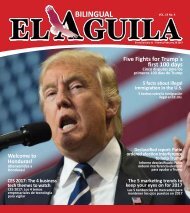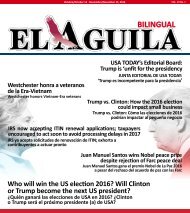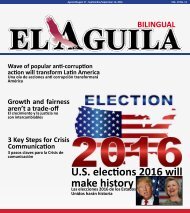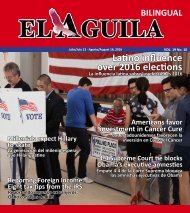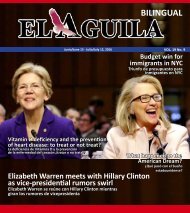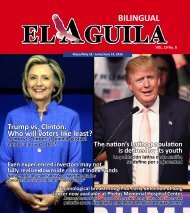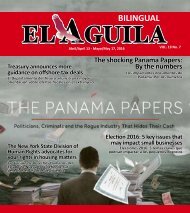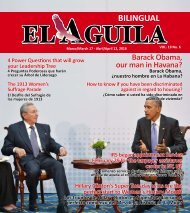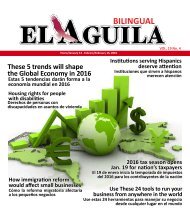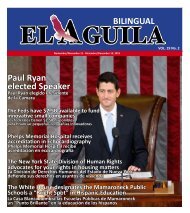El Aguila Magazine – November 16, 2016
You also want an ePaper? Increase the reach of your titles
YUMPU automatically turns print PDFs into web optimized ePapers that Google loves.
<strong>El</strong> <strong>Aguila</strong> Noviembre/<strong>November</strong> <strong>16</strong> - Diciembre/December 13, 20<strong>16</strong><br />
Donald Trump puede ser muy bueno para la economía<br />
de los Estados Unidos<br />
Donald Trump tiene el potencial<br />
de ser una fuerza masiva<br />
de bien para la economía. La<br />
historia de la economía estadounidense<br />
en los pasados ocho años es<br />
una de tensión entre una política<br />
“monetaria” agresiva y una política<br />
“fiscal” inexistente.<br />
La política monetaria ha venido del<br />
Fed (banco federal) bajando las tasas<br />
de interés a cerca de cero en un<br />
esfuerzo de inflar la economía. Esta<br />
política ha llevado a un crecimiento<br />
tibio, y esencialmente sigue su curso.<br />
Solamente hay tanto que el Fed<br />
puede hacer. La política fiscal es<br />
una combinación de reformar el<br />
código de impuestos corporativos y<br />
el gasto del gobierno en proyectos<br />
grandes que inyectarán dinero en la<br />
economía y creará trabajos nuevos.<br />
Con los republicanos ahora en control<br />
de la Casa Blanca en ambas cámaras<br />
del Congreso, los años largos<br />
de enfrentamiento pueden ser rotos.<br />
<strong>El</strong> Presidente Barack Obama obtuvo<br />
un paquete de estímulo relativamente<br />
endeble aprobado al comienzo<br />
de su término pero no ha podido<br />
hacer nada desde entonces. <strong>El</strong> economista<br />
de izquierda Paul Krugman<br />
ha estado golpeando la mesa para<br />
un aumento en el estímulo fiscal por<br />
varios años ahora, en vano. Trump<br />
puede cambiar todo esto.<br />
Lo primero que Trump mencionó<br />
en su discurso de Victoria fue gastar<br />
en infraestructura.<br />
“Vamos a arreglar nuestras ciudades<br />
del interior, y reconstruir nuestras<br />
carreteras, puentes, túneles,<br />
aeropuertos, escuelas, hospitales”,<br />
dijo él. “Vamos a reconstruir nuestra<br />
infraestructura, que se convertirá<br />
en insuperable. Y pondremos millones<br />
de nuestra gente a trabajar para<br />
reconstruirla”.<br />
Durante estas elecciones, Trump prometió<br />
gastar mucho en programas<br />
que crearían un número incalculable<br />
de puestos de trabajo en construcción,<br />
fabricación de hierro y otros<br />
sectores. Él dijo que su enfoque seria<br />
en transportación, agua, telecomunicaciones<br />
y energía.<br />
“Podemos trabajar juntos para rápidamente<br />
pasar un proyecto de ley robusto<br />
de trabajos de infraestructura”,<br />
dijo la Líder de la Minoría Nancy<br />
Pelosi , según un tweet de Jonathan<br />
Martin del New York Times.<br />
Más allá del gasto de infraestructura,<br />
las políticas económicas de Trump<br />
incluyen cortes de impuestos en todo<br />
el país para individuos y reducción<br />
de impuestos corporativos a 15 por<br />
ciento de 35 por ciento. Además, él<br />
prometió reducir las regulaciones que<br />
él dice están siendo una carga para los<br />
negocios y deteniendo la creación de<br />
trabajos.<br />
Finalmente, él dijo que “revocaría y<br />
sustituiría” Obamacare, una promesa<br />
que probablemente el podrá cumplir<br />
con un Congreso republicano.<br />
Los economistas generalmente han<br />
temido que el estímulo de gastos y<br />
cortes de impuestos podría aumentar<br />
la deuda nacional por $5 trillones o<br />
más. También creen que su encendida<br />
retórica acerca de la manipulación<br />
de la moneda y tarifas puede precipitar<br />
una guerra comercial. Pero Trump<br />
ha mantenido que el crecimiento<br />
económico más que compensa y no<br />
necesita aumentos de impuesto para<br />
pagar por el gasto de infraestructura<br />
en particular.<br />
Y, por lo que vale, Krugman ha argumentado<br />
que necesitamos aumentar<br />
nuestra deuda. Los seguidores de<br />
Trump creen que Trump puede hacer<br />
todo esto en una manera responsable.<br />
“Ese plan es neutral a las ganancias<br />
porque usa un Sistema innovador de<br />
Donald Trump can be very good for the US economy<br />
-By Jay Yarow and Jeff Cox<br />
Donald Trump has the potential to<br />
be a massive force for good for<br />
the economy. The story of the<br />
American economy in the past eight<br />
years is one of tension between an aggressive<br />
“monetary” policy and a nonexistent<br />
“fiscal” policy.<br />
Monetary policy has come from the Fed<br />
lowering interest rates to nearly zero in<br />
an effort to pump up the economy. This<br />
policy has led to tepid growth, and essentially<br />
run its course. There is only so<br />
much the Fed can do. Fiscal policy is a<br />
combination of reforming the corporate<br />
tax code and government spending on<br />
big projects that will pump money into<br />
the economy and create new jobs. With<br />
Republicans now in control of the White<br />
House and both houses of Congress, the<br />
years-long standoff may be broken.<br />
President Barack Obama got a relatively<br />
wimpy stimulus package passed at<br />
the start of his term but hasn’t been able<br />
to get anything going since then. Leftwing<br />
economist Paul Krugman has been<br />
pounding the table for an increase in fiscal<br />
stimulus for years now, to no avail.<br />
PRIMER PLANO/FRONT PAGE<br />
Una de las primeras cosas que Trump mencionó en su discurso de victoria fue reconstruir la infraestructura nacional<br />
- Por Jay Yarow and Jeff Cox<br />
créditos de impuestos para ayudar<br />
con todos las otras fuentes de financiamiento<br />
que tenemos. La última<br />
cosa que usted quiere hacer es aumentar<br />
los impuestos para financiar<br />
un programa de infraestructura”,<br />
Peter Navarro, un asesor de política<br />
de Trump, le dijo a CNBC. “Eso<br />
no pasará en la administración de<br />
Trump”.<br />
“Todo lo que el Sr. Trump va hacer<br />
apunta en la dirección de crecimiento”.<br />
Agregó él.<br />
Los mercados inicialmente reaccionaron<br />
a la victoria de Trump con<br />
una sacudida, llevando a los futuros<br />
de Dow a una caída en picado de<br />
800 puntos en un momento por la<br />
noche. Pero dada la oportunidad de<br />
digerir el camino adelante, el mercado<br />
de valores se recuperó, con el índice<br />
blue-chip volviéndose positivo en<br />
las operaciones de la mañana. En el<br />
mercado de materias primas, que son<br />
quizás un jefe para el crecimiento económico<br />
adelante, los precios mejoraron.<br />
Copper—o “Dr. Copper” como<br />
a menudo lo llaman por sus capacidades<br />
predictivas—sugiere tanto como<br />
3 por ciento.<br />
“No olvidemos que la clave constante<br />
en la campaña de elecciones de<br />
Trump era continuamente sorprender<br />
al público”, Stefan Kreuzkamp, oficial<br />
jefe de inversiones del Deutsche<br />
Asset Management, dijo en una nota a<br />
clientes. “Es enteramente posible que<br />
después de estas elecciones, de hecho<br />
Trump could change all of this.<br />
The first thing Trump mentioned in his<br />
victory speech was spending on infrastructure.<br />
“We are going to fix our inner cities, and<br />
rebuild our highways, bridges, tunnels,<br />
airports, schools, hospitals,” he said.<br />
“We’re going to rebuild our infrastructure,<br />
which will become, by the way, second<br />
to none. And we will put millions<br />
of our people to work as we rebuild it.”<br />
During the election, Trump promised to<br />
spend heavily on programs that would<br />
create untold numbers of jobs in construction,<br />
steel manufacturing and other<br />
sectors. He said his focus would be on<br />
transportation, water, telecom and energy.<br />
“We can work together to quickly pass<br />
a robust infrastructure jobs bill,” House<br />
Minority Leader Nancy Pelosi said, according<br />
to a tweet by Jonathan Martin of<br />
The New York Times.<br />
Beyond the infrastructure spending,<br />
Trump’s economic policies include<br />
across-the-board tax cuts for individuals<br />
and a slashing of corporate taxes down to<br />
15 percent from 35 percent. In addition,<br />
he pledged to slash regulations that he<br />
said are burdening businesses and holding<br />
back job creation.<br />
Finally, he said he would “repeal and<br />
replace” Obamacare, a pledge that he<br />
likely will be able to fulfill with a Republican<br />
Congress.<br />
Economists generally have feared that<br />
Trump’s spending stimulus and tax cuts<br />
would increase the national debt by $5<br />
trillion or more. They also believe his<br />
fiery rhetoric about currency manipulation<br />
and tariffs could spark a trade war.<br />
But Trump has maintained that economic<br />
growth would more than compensate<br />
and not necessitate tax hikes to pay for<br />
the infrastructure spending in particular.<br />
And, for what it’s worth, Krugman has<br />
argued that we need to increase our debt:<br />
Trump supporters believe Trump can<br />
do all of this in a responsible way. “That<br />
plan is revenue-neutral because it uses a<br />
very innovative system of tax credits to<br />
help with all the other sources of funding<br />
we have. The last thing you want to do<br />
is raise taxes to fund an infrastructure<br />
program,” Peter Navarro, a senior policy<br />
adviser to Trump, told CNBC. “That will<br />
not happen in a Trump administration.”<br />
“Everything that Mr. Trump is going to<br />
do points in the direction of growth,” he<br />
added<br />
Markets initially reacted with shock at the<br />
Trump win, sending Dow futures plummeting<br />
800 points at one point overnight.<br />
But given the chance to digest the road<br />
ahead, the stock market recovered, with<br />
the blue-chip index turning positive in<br />
morning trading. On the commodities<br />
markets, which are perhaps a bellwether<br />
for economic growth ahead, prices rallied.<br />
Copper — or “Dr. Copper” as it is<br />
often called for its predictive abilities —<br />
surged as much as 3 percent.<br />
“Let us not forget that the key constant<br />
in Trump’s election campaign was to<br />
continually surprise the public,” Stefan<br />
Kreuzkamp, chief investment officer at<br />
Deutsche Asset Management, said in a<br />
note to clients. “It is entirely possible that<br />
after his election, he could in fact surprise<br />
markets on the positive side.” There are,<br />
of course, other nonpolicy things that can<br />
impact the economy. The biggest concern<br />
for anyone banking on an economic<br />
shot in the arm has to center on Trump’s<br />
foreign policy.<br />
How will Trump react when a foreign<br />
power tests him militarily? We have<br />
no idea.But, if we simply look at what<br />
Trump can do for the economy based on<br />
fiscal policy changes there is reason to be<br />
optimistic that he can help the economy.<br />
Source: CNBC<br />
3<br />
él podría sorprender a los mercados en<br />
el lado positivo”. Existen, por supuesto,<br />
otras cosas no políticas que pueden<br />
impactar la economía. La más grande<br />
preocupación para cualquiera dependiendo<br />
en una inyección económica en<br />
el brazo tiene que centrarse en la política<br />
exterior de Trump.<br />
¿Cómo reaccionará Trump cuando un<br />
poder extranjero lo examine militarmente?<br />
No tenemos la menor idea.<br />
Pero, si simplemente miramos a lo que<br />
Trump puede hacer para la economía<br />
en base a los cambios de política fiscal<br />
hay razón para ser optimista que él puede<br />
ayudar a la economía.<br />
Fuente: CNBC<br />
One of the first things Trump talked about in his victory speech was rebuilding the<br />
national infrastructure.



